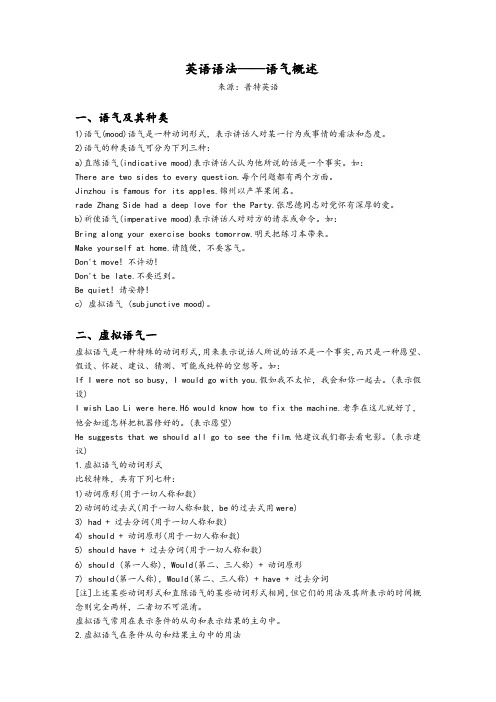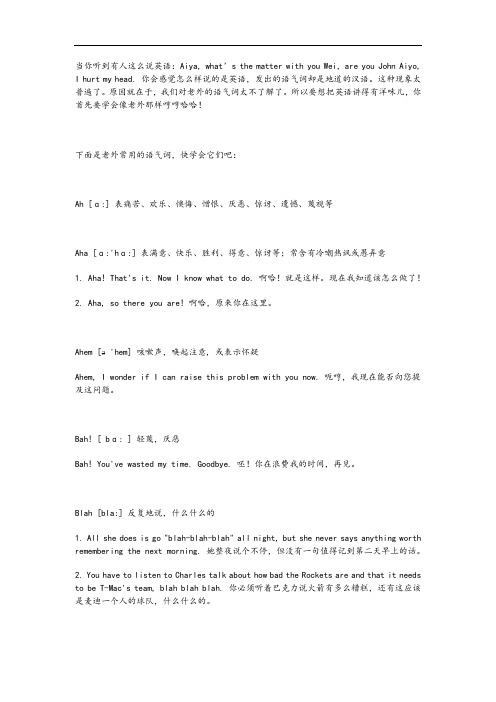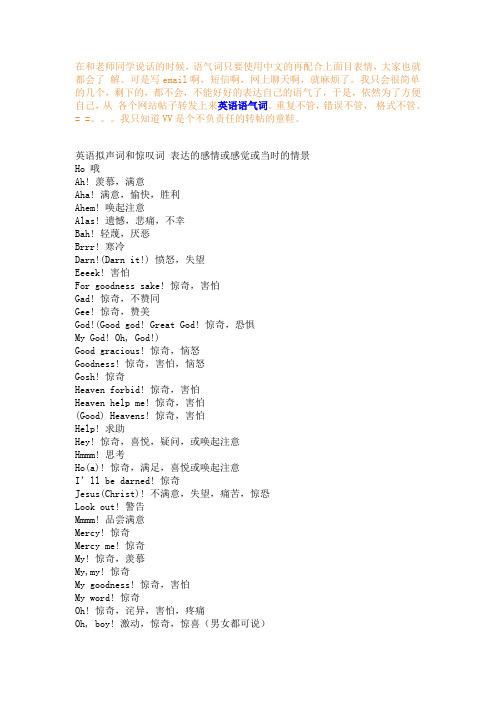(完整版)英语语气
- 格式:doc
- 大小:53.01 KB
- 文档页数:6

口语表达中的各种不同语气1. as you say表示勉强地同意他人的要求或命令时的用语,“遵命,好吧”如:-I want this done right now.-As you say, sir.-立即把它做出来-好,就做出来,先生。
2.dare I say it要说可能使用对方不高兴或失望的话,因此为引导“说句不中听的话,说的难听一点”如:The British singers, dare I say it, are only middling.英国的歌手,说句不中听的话,不怎么样。
3.don't say表示反感,惊讶,不耐烦,怀疑“可别又扯什么……”如:Don't say you have broken another cup.我可不想听到你又打了个杯子啊。
4.easier said than done“说起来容易,做起来难”如:Persuading a child to eat is easier said than done.哄孩子吃饭真是说起来容易做起来难啊。
5.I can't say委婉地表示不赞同或否定“恐怕我不……”如:I can't say I want to go and visit your parents this week.周末我不太想去见你的父母。
6.I couldn't say...“我说不上来;很难讲;不知道”如:I couldn't say how long the treatment is likely to take.我不知道这种疗法要多长时间。
10.I'm bound to say...表示强调你必须说或者承认“很惭愧地讲”如:I'm bound to say that it is the British who are mostly to be blamed. 惭愧地讲(说话人本身是英国人),英国人最该受谴责。

英语语法——语气概述来源:普特英语一、语气及其种类1)语气(mood)语气是一种动词形式,表示讲话人对某一行为或事情的看法和态度。
2)语气的种类语气可分为下列三种:a)直陈语气(indicative mood)表示讲话人认为他所说的话是一个事实。
如:There are two sides to every question.每个问题都有两个方面。
Jinzhou is famous for its apples.锦州以产苹果闻名。
rade Zhang Side had a deep love for the Party.张思德同志对党怀有深厚的爱。
b)祈使语气(imperative mood)表示讲话人对对方的请求或命令。
如:Bring along your exercise books tomorrow.明天把练习本带来。
Make yourself at home.请随便,不要客气。
Don't move! 不许动!Don't be late.不要迟到。
Be quiet! 请安静!c) 虚拟语气 (subjunctive mood)。
二、虚拟语气一虚拟语气是一种特殊的动词形式,用来表示说话人所说的话不是一个事实,而只是一种愿望、假设、怀疑、建议、猜测、可能或纯粹的空想等。
如:If I were not so busy,I would go with you.假如我不太忙,我会和你一起去。
(表示假设)I wish Lao Li were here.H6 would know how to fix the machine.老李在这儿就好了,他会知道怎样把机器修好的。
(表示愿望)He suggests that we should all go to see the film.他建议我们都去看电影。
(表示建议)1.虚拟语气的动词形式比较特殊,共有下列七种:1)动词原形(用于一切人称和数)2)动词的过去式(用于一切人称和数,be的过去式用were)3) had + 过去分词(用于一切人称和数)4) should + 动词原形(用于一切人称和数)5) should have + 过去分词(用于一切人称和数)6) should (第一人称),Would(第二、三人称) + 动词原形7) should(第一人称),Would(第二、三人称) + have + 过去分词[注]上述某些动词形式和直陈语气的某些动词形式相同,但它们的用法及其所表示的时间概念则完全两样,二者切不可混淆。

当你听到有人这么说英语:Aiya, what’s the matter with you Wei, are you John Aiyo, I hurt my head. 你会感觉怎么样说的是英语,发出的语气词却是地道的汉语。
这种现象太普遍了。
原因就在于,我们对老外的语气词太不了解了。
所以要想把英语讲得有洋味儿,你首先要学会像老外那样哼哼哈哈!下面是老外常用的语气词,快学会它们吧:Ah [ɑ:] 表痛苦、欢乐、懊悔、憎恨、厌恶、惊讶、遗憾、蔑视等Aha [ɑ:'hɑ:] 表满意、快乐、胜利、得意、惊讶等;常含有冷嘲热讽或愚弄意1. Aha! That's it. Now I know what to do. 啊哈!就是这样。
现在我知道该怎么做了!2. Aha, so there you are! 啊哈,原来你在这里。
Ahem [ə'hem] 咳嗽声,唤起注意, 或表示怀疑Ahem, I wonder if I can raise this problem with you now. 呃哼,我现在能否向您提及这问题。
Bah! [ bɑ: ] 轻蔑,厌恶Bah! You've wasted my time. Goodbye. 呸!你在浪费我的时间,再见。
Blah [bla:] 反复地说,什么什么的1. All she does is go "blah-blah-blah" all night, but she never says anything worth remembering the next morning. 她整夜说个不停,但没有一句值得记到第二天早上的话。
2. You have to listen to Charles talk about how bad the Rockets are and that it needs to be T-Mac's team, blah blah blah. 你必须听着巴克力说火箭有多么糟糕,还有这应该是麦迪一个人的球队,什么什么的。

英语口语中的常见语气表达语气表达在英语口语中起到非常重要的作用,它可以用来表达说话者的情感、态度以及对事物的看法。
以下是英语口语中常见的语气表达方式及其用法。
1. 祈使语气 (Imperative Mood)祈使语气用于表示请求、命令、建议或劝告等,常见的形式包括动词原形和"Let's + 动词原形"。
例句:- Please close the door.(请关门。
)- Let's go to the park.(我们去公园吧。
)2. 祝愿语气 (Wish Mood)祝愿语气用于表达对将来情况的期望和祝愿,常见的形式包括"I wish (that) + 句子"和"May + 主语 + 动词原形"。
例句:- I wish you good luck in your new job.(祝你在新工作中好运。
)- May you have a wonderful journey.(祝你旅途愉快。
)3. 假设语气 (Conditional Mood)假设语气用于表示虚拟、假设或条件意义,常见的形式包括"if + 主语 + 动词过去式"和"should + 动词原形"。
例句:- If I had more money, I would travel around the world.(如果我有更多的钱,我会环游世界。
)- Should you need any assistance, feel free to ask.(如果你需要任何帮助,随时问我。
)4. 告诫语气 (Admonitory Mood)告诫语气用于表示警告、劝阻或责备的意思,常见的形式包括"Be careful + 现在分词/形容词"和"Don't + 动词原形"。
例句:- Be careful when crossing the road.(过马路时要小心。

在和老师同学说话的时候,语气词只要使用中文的再配合上面目表情,大家也就都会了解。
可是写email啊,短信啊,网上聊天啊,就麻烦了。
我只会很简单的几个,剩下的,都不会,不能好好的表达自己的语气了,于是,依然为了方便自己,从各个网站帖子转发上来英语语气词。
重复不管,错误不管,格式不管。
= =。
我只知道VV是个不负责任的转帖的童鞋。
英语拟声词和惊叹词表达的感情或感觉或当时的情景Ho 哦Ah! 羡慕,满意Aha! 满意,愉快,胜利Ahem! 唤起注意Alas! 遗憾,悲痛,不幸Bah! 轻蔑,厌恶Brrr! 寒冷Darn!(Darn it!) 愤怒,失望Eeeek! 害怕For goodness sake! 惊奇,害怕Gad! 惊奇,不赞同Gee! 惊奇,赞美God!(Good god! Great God! 惊奇,恐惧My God! Oh, God!)Good gracious! 惊奇,恼怒Goodness! 惊奇,害怕,恼怒Gosh! 惊奇Heaven forbid! 惊奇,害怕Heaven help me! 惊奇,害怕(Good) Heavens! 惊奇,害怕Help! 求助Hey! 惊奇,喜悦,疑问,或唤起注意Hmmm! 思考Ho(a)! 惊奇,满足,喜悦或唤起注意I’ll be darned! 惊奇Jesus(Christ)! 不满意,失望,痛苦,惊恐Look out! 警告Mmmm! 品尝满意Mercy! 惊奇Mercy me! 惊奇My! 惊奇,羡慕My,my! 惊奇My goodness! 惊奇,害怕My word! 惊奇Oh! 惊奇,诧异,害怕,疼痛Oh, boy! 激动,惊奇,惊喜(男女都可说)Oh, dear! 惊奇Oh,my! 惊奇,羡慕Oh, no! 害怕,惊奇,失望Oho! 惊奇Oh-oh! 遇到不顺心的事Ouch 疼痛Ow! 疼痛Oh, well! 无可奈何Psst! 唤起注意Say! 唤起注意,或想起什么Shit! 愤怒,厌恶,沮丧Thank God! 宽慰,感谢Thank goodness! 感谢Tsk-tsk! 不赞同Tut-tut! 不满,不耐烦Ugh! 厌恶Unbelievable! 惊讶Watch it! 警告Watch out! 警告Well! 惊奇,宽慰Well, I never! 惊奇,愤怒Well,well! 惊奇Whew! 如释重负Whoopee! 高兴Whoop! 欣喜,兴奋,或因手脚笨拙而感到尴尬Wow! 诧异,惊讶,羡慕,快乐Yuck 厌恶===================================================================== =========================Ah! 羡慕,满意Aha! 满意,愉快,胜利Ahem! / ə'hem / 唤起注意, 用咳嗽来引起注意,或表示怀疑e.g. Ahem, I wonder if I can raise this problem with you now. 呃哼,我现在能否向您提及这问题。

当你听到有人这么说英语:Aiya, what’s the matter with you? Wei, are you John? Aiyo, I hurt my head. 你会感觉怎么样?说的是英语,发出的语气词却是地道的汉语。
这种现象太普遍了。
原因就在于,我们对老外的语气词太不了解了。
所以要想把英语讲得有洋味儿,你首先要学会像老外那样哼哼哈哈!下面是老外常用的语气词,快学会它们吧:Ah [ɑ:] 表痛苦、欢乐、懊悔、憎恨、厌恶、惊讶、遗憾、蔑视等Aha [ɑ:'hɑ:] 表满意、快乐、胜利、得意、惊讶等;常含有冷嘲热讽或愚弄意1. Aha! That's it. Now I know what to do. 啊哈!就是这样。
现在我知道该怎么做了!2. Aha, so there you are! 啊哈,原来你在这里。
Ahem [?'hem] 咳嗽声,唤起注意, 或表示怀疑Ahem, I wonder if I can raise this problem with you now. 呃哼,我现在能否向您提及这问题。
Bah! [ bɑ: ] 轻蔑,厌恶Bah! You've wasted my time. Goodbye. 呸!你在浪费我的时间,再见。
Blah [bla:] 反复地说,什么什么的1. All she does is go "blah-blah-blah" all night, but she never says anything worth rememberingthe next morning. 她整夜说个不停,但没有一句值得记到第二天早上的话。
2. You have to listen to Charles talk about how bad the Rockets are and that it needs to be T-Mac's team, blah blah blah. 你必须听着巴克力说火箭有多么糟糕,还有这应该是麦迪一个人的球队,什么什么的。
当你听到有人这么说英语:Aiya, what’s the matter with you? Wei, are you John? Aiyo, I hurt my head. 你会感觉怎么样?说的是英语,发出的语气词却是地道的汉语。
这种现象太普遍了。
原因就在于,我们对老外的语气词太不了解了。
所以要想把英语讲得有洋味儿,你首先要学会像老外那样哼哼哈哈!下面是老外常用的语气词,快学会它们吧:Ah [ɑ:] 表痛苦、欢乐、懊悔、憎恨、厌恶、惊讶、遗憾、蔑视等Aha [ɑ:'hɑ:] 表满意、快乐、胜利、得意、惊讶等;常含有冷嘲热讽或愚弄意1. Aha! That's it. Now I know what to do. 啊哈!就是这样。
现在我知道该怎么做了!2. Aha, so there you are! 啊哈,原来你在这里。
Ahem [ə'hem] 咳嗽声,唤起注意, 或表示怀疑Ahem, I wonder if I can raise this problem with you now. 呃哼,我现在能否向您提及这问题。
Bah! [ bɑ: ] 轻蔑,厌恶Bah! You've wasted my time. Goodbye. 呸!你在浪费我的时间,再见。
Blah [bla:] 反复地说,什么什么的1. All she does is go "blah-blah-blah" all night, but she never says anything worth remembering the next morning. 她整夜说个不停,但没有一句值得记到第二天早上的话。
2. You have to listen to Charles talk about how bad the Rockets are and that it needs to be T-Mac's team, blah blah blah. 你必须听着巴克力说火箭有多么糟糕,还有这应该是麦迪一个人的球队,什么什么的。
当你听到有人这么说英语:Aiya, what’s the matter with you? Wei, are you John? Aiyo, I hurt my head. 你会感觉怎么样?说的是英语,发出的语气词却是地道的汉语。
这种现象太普遍了。
原因就在于,我们对老外的语气词太不了解了。
所以要想把英语讲得有洋味儿,你首先要学会像老外那样哼哼哈哈!下面是老外常用的语气词,快学会它们吧:Ah [ɑ:] 表痛苦、欢乐、懊悔、憎恨、厌恶、惊讶、遗憾、蔑视等Aha [ɑ:'hɑ:] 表满意、快乐、胜利、得意、惊讶等;常含有冷嘲热讽或愚弄意1. Aha! That's it. Now I know what to do. 啊哈!就是这样。
现在我知道该怎么做了!2. Aha, so there you are! 啊哈,原来你在这里。
Ahem [ə'hem] 咳嗽声,唤起注意, 或表示怀疑Ahem, I wonder if I can raise this problem with you now. 呃哼,我现在能否向您提及这问题。
Bah! [ bɑ: ] 轻蔑,厌恶Bah! You've wasted my time. Goodbye. 呸!你在浪费我的时间,再见。
Blah [bla:] 反复地说,什么什么的1. All she does is go "blah-blah-blah" all night, but she never says anything worth remembering the next morning. 她整夜说个不停,但没有一句值得记到第二天早上的话。
2. You have to listen to Charles talk about how bad the Rockets are and that it needs to be T-Mac's team, blah blah blah. 你必须听着巴克力说火箭有多么糟糕,还有这应该是麦迪一个人的球队,什么什么的。
英语语气的用法大全语气及其种类1)语气(mood)语气是一种动词形式,表示讲话人对某一行为或事情的看法和态度。
2)语气的种类语气可分为下列三种:a)直陈语气(indicative mood)表示讲话人认为他所说的话是一个事实。
如:There are two sides to every question.每个问题都有两个方面。
Jinzhou is famous for its apples.锦州以产苹果闻名。
Comrade Zhang Side had a deep love for the Party.张思德同志对党怀有深厚的爱。
b)祈使语气(imperative mood)表示讲话人对对方的请求或命令。
如:Bring along your exercise books tomorrow.明天把练习本带来。
Make yourself at home.请随便,不要客气。
Don't move! 不许动!Don't be late.不要迟到。
Be quiet! 请安静!c) 虚拟语气 (subjunctive mood)。
虚拟语气 A虚拟语气虚拟语气是一种特殊的动词形式,用来表示说话人所说的话不是一个事实,而只是一种愿望、假设、怀疑、建议、猜测、可能或纯粹的空想等。
如:If I were not so busy,I would go with you.假如我不太忙,我会和你一起去。
(表示假设)I wish Lao Li were here.H6 would know how to fix the machine.老李在这儿就好了,他会知道怎样把机器修好的。
(表示愿望)He suggests that we should all go to see the film.他建议我们都去看电影。
(表示建议)虚拟语气的动词形式比较特殊,共有下列七种:1)动词原形(用于一切人称和数)2)动词的过去式(用于一切人称和数,be的过去式用were)3) had + 过去分词(用于一切人称和数)4) should + 动词原形(用于一切人称和数)5) should have + 过去分词(用于一切人称和数)6) should (第一人称),Would(第二、三人称) + 动词原形7) should(第一人称),Would(第二、三人称) + have + 过去分词[注]上述某些动词形式和直陈语气的某些动词形式相同,但它们的用法及其所表示的时间概念则完全两样,二者切不可混淆。
语气(mood)是一种动词形式,用以表示说话者的意图或态度。
英语中的语气有三种:陈述语气、祈使语气和虚拟语气。
直陈语气(indicative mood),表示所说的话是事实。
祈使语气(imperative mood),表示所说的话是请求或命令。
虚拟语气(subjunctive mood),表示说的话不是事实,或者是不可能发生的情况,而是一种愿望、建议或与事实相反的假设等。
I. 虚拟语气在状语从句中的应用1.虚拟语气条件句中的应用:学习虚拟语气在条件句中的用法之前我们必须清楚条件句的种类:条件句有真实条件句与非真实条件句(或称虚拟条件句)两种。
真实条件句所表的假设是可能发生或实现的,句中的条件从句与结果主句都用陈述语气。
如If it doesn’t rain tomorrow, I will go for a picnic. 假若明天不下雨,我就去野餐。
Oil floats if you pour it on water. 你如把油倒在水里,油就浮起来。
(1).虚拟条件句所表的假设则是不可能或不大可能发生或实现的,句中的条件从句与结果主句皆须用虚拟语气。
③If you had got up earlier yesterday, you would have caught the train.She would have gone to the party if she had been invited.要是当初她被邀请的话,她就会去参加这次聚会了。
(事实是:当时没有人邀请她,因此,她没有来参加聚会。
表示后悔。
)④If she hadn't called me, I would have overslept this morning.今天早上,她要是不叫我的话,我就会睡过头了。
(事实是:她今天早上叫我了,我没有睡过头。
表示感激。
)⑤If I saw him tomorrow , I would pass your note to him .⑥If I were to be twenty years old next year, I would take the course of French.明年我要是二十岁,我就会学法语。
(事实是:我现在已经老了,明年我学不了法语了。
)⑦If it should fail, I would try again.要是失败了,我会再试一次。
(事实是:有可能失败,可我会再试。
表示未知。
)虚拟过去式有时并不表示“不大可能实现的假设”,而是表示一种希望或不希望发生的动作。
如:If we caught the early train, we’d get there by lunch time.假如我们赶上早班火车,到午饭时间我们就会到达那里了。
(表希望)If we missed the train, we should have to wait an hour at the station.假如我们赶不上这班火车,我们就得在车站等一小时。
(表不希望)(2). 混合型的条件句当条件从句与主句所表的时间不一致时,虚拟语气的形式应作相应的调整。
主句和从句的谓语动词并不相互呼应,这种条件句叫混合条件句。
较多见的混合型条件句是从句用过去完成时(指过去行为),而主句用一般时(指目前状态)。
He would pass the test if he had taken my advice.如果他听了我的劝告,他现在会通过考试。
If I had spoken to him yesterday, I should know what to do now. 假如昨天我对他说了,现在我就知道该怎么办了。
You would be much better now if you had taken my advice. 假如你接受了我的意见,你现在就会好得多。
如条件从句用if I were...,主句则可用表任何时间的虚拟形式。
如If I were not busy, I would have come.假如我不忙,我就会去了。
(were表过去)If I were you, I would go.假如我是你,我会去的。
(were表现在)(3). 含蓄条件句虚拟条件句中的条件从句有时不表出来,只暗含在上下文中,这种句子叫做含蓄条件句。
含蓄条件句大体有三种情况。
1) 条件暗含在短语中。
如:But for your help we couldn’t have succeeded in the experiment.如果没有你的帮助,我们的实验是不会成功的。
(暗含在分词短词but for your help)What would I have done without you? 如没有你,我会怎么办呢?(条件暗含在介词短语without you 中)It would be easier to do it this way. 这样做会比较容易。
(条件暗含在不定式短语to do it this way中)This same thing, happening in wartime, amount to disaster.同样的事,如发生在战时,就会酿成大祸。
(条件暗含在分词短语happening in wartime 中)He must have the strength of a hippopotamus, or he never could have vanquished that great beast. 他一定是力大如河马,否则他绝不会击败那只庞大的野兽。
(暗含条件是连词or)Alone, he would have been terrified. 如是单独一人,他是会感到害怕的。
(暗含条件是alone)2) 条件暗含在上下文中。
如:You might stay here forever. 你可以永远待在这儿。
(可能暗含if you wanted to)We would have succeeded. 我们本来是会成功的。
(可能暗含if we had kept trying)Your reputation would be ruined. 你的名誉会败坏的。
(可能暗含if you should accept it)3) 在不少情况下,虚拟式已变成习惯说法,很难找出其暗含的条件。
如:You wo uldn’t know. 你不会知道。
I would like to come. 我愿意来。
(4). 不用if引导的条件从句虚拟条件句中的条件从句除用if引外,还可用when, unless, lest, suppose, as if, forfear, in case, on condition 等词语来引导。
如:The peasants prepared to feed the city when it should be freed. 农民已准备在这座城市解放后供给粮食。
Lest you should not have heard all, I shall begin at the beginning. 我怕你没有听全,所以我再从头开始讲一遍。
Unless I were well, I wouldn’t be at school. 除非我好了,否则我不会上学。
Suppose you were given a chance to study in America , would you accept?假如给你一个到美国学习的机会,你会接受吗?(suppose 或supposing =what if)Supposing it were so?(=Supposing it were so,what would happen?)要是这样的话,会怎么样呢?He can use the bicycle on condition that he should return it tomorrow.如果明天能还回来,他就可以借用这辆自行车。
In case I forget , please remind me of my promise 如果我忘了,请提醒我的诺言。
Susan is walking slowly ,as if she were tired. 苏珊走得很慢,就像是累了似的。
与if一样,上述词语所引导的条件从句亦可用直陈语气,表可能实现或发生的事。
(5).If 引导的非真实条件句中的谓语部分有were, had, should时,可以把if去掉,而将were,had, should提到主语的前面,构成倒装结构。
而且省略的if从句一般置于主句之前(尤其是在肯定句和否定句中)。
多见于书面语。
Had you not helped me,I should have failed.要是没有你的帮助,我就失败了。
Were you in my position, you would do the same. 假如你处在我的地位,你也会这样干的。
Should they attack us, we’ll wipe them out completely. 假如他们进攻我们,我们就把他们彻底消灭干净。
Had it not been for your help, we would not have achieved so much.我的练习,我做主:1.If he had not missed the train, he ______ by then.A.might get B.might have got C.got D.had got2.If I ______ out of my ink, I would have finished writing the paper.A.didn't run B.shouldn't run C.haven't run D.hadn't run3.I would have gone to the meeting,if I ______ more time.A.had had B.have had C.had D.would have had4.I could have done better if I ______ more time.A.have had B.had C.had had D.will have had5.If I ______ you,I wouldn't return the call.A.be B.am C.was D.were6.______ today,he would get there by Friday.A.Would he leave B.Was he leaving C.Were he to leave D.If he leaves7.If I had hurried,I ______ the train.A.would catch B.could catch C.would have caught D.had caught8.If you had been with us,you ______ our excitement.A.have understood B.understood C.will understand D.would have understood9.Without your help,we ______ so much.A.will not achieve B.didn't achieve C.don't achieve D.would not have achieved10.If he ______ the storekeeper's scissors, he would have forgotten to buy a pair.A.would not seen B.had not seen C.had seen D.has seen11.But for water,it ______ possible to live in the desert.A.is B.was C.were D.wouldn't be12.______ it______ for your help,I couldn't have made any progress.A.Had;not beenB.Should;not been C.Did;not beenD.Not;be13.Long ______ the Party!A.lives B.live C.will live D.should live14.If only I ______ my car!A.hadn't lost B.would not lose C.didn't lose D.haven't lost 15.______ I be free tomorrow,I could go with you.A.Could B.Should C.Might D.Must16.What would have happened _______, as far as the river bank.A.Bob had walked fartherB.if Bob should walk fartherC.had Bob walked fartherD.if Bob walked farther。